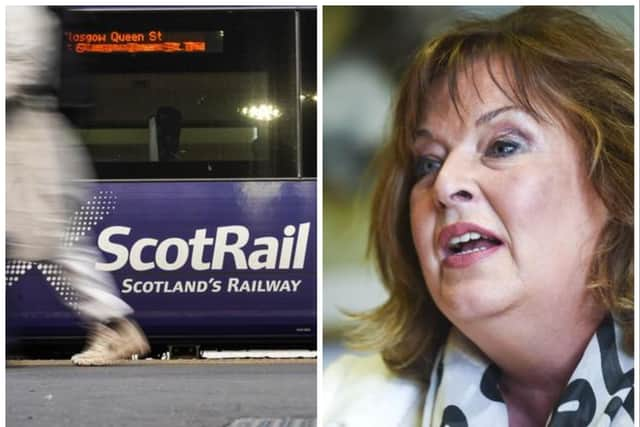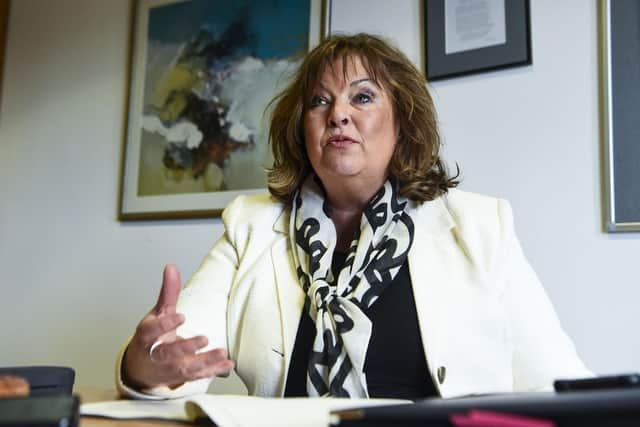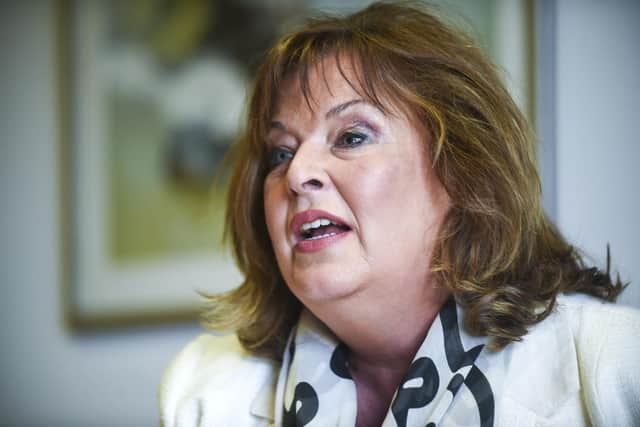ScotRail peak fares suspension could continue if trial successful – Transport Secretary Fiona Hyslop
Transport Secretary Fiona Hyslop has given the biggest hint yet she would like to further extend the suspension of ScotRail’s higher-rate peak fares as she awaits results from the trial which is due to end in June.
She said she would like to see the nine-month experiment continue if it had persuaded people to switch from cars to trains, or if more funding became available.
Advertisement
Hide AdAdvertisement
Hide AdMs Hyslop told The Scotsman "if it’s successful I will want to be able to continue it” and "should I be able to find more resources, then I'd be interested in extending it.”


However, the cabinet secretary added “that isn't the current position", suggesting the fate of the experiment, which has seen some ticket prices halved, may depend on the assessment of its impact.
Senior rail industry sources expect the fares cut – which has cross-party support – to continue after June 28, possibly permanently, because passengers have now become used to the benefit for more than six months.
This is despite the initiative reducing ScotRail’s fares income by nearly 10 per cent, or the equivalent of £30 million a year.
Commuters who have switched to rail by the removal of the premium fare on travel at peak times before and after the beginning of the traditional working day are likely to include car drivers.


Ms Hyslop would not want to see them tempted to get back behind the wheel if the lower fares are scrapped since ministers have set an ambitious target of cutting road cut traffic by 20 per cent by 2030.
The cabinet secretary said she was about to get an interim report on the trial, which will be published, to be followed by a fuller study. Evaluation has been hampered by the unusually large number of winter storm which have disrupted travel.
Ms Hyslop said: “We need to see how successful it is, on different measures. It has saved a lot of people a lot of money during the cost of living crisis, but the key test will be, does it persuade people to use the train rather than the car?
Advertisement
Hide AdAdvertisement
Hide Ad"It is proving successful from my personal knowledge because I regularly use the train and it’s getting busier, which is good.


"We have got real challenges in our budget, but by making this step we can demonstrate if it’s successful, and if it’s successful I will want to be able to continue it.
"But I can’t make that decision until I have a proper evidence base. Value for money? Yes. But primarily, does it deliver the shift?”
Asked if it would be a difficult move to scrap the scheme after nine months, she said: "In politics, you have to make tough choices, but you also have to change and adapt as circumstances change, and should I be able to find more resources, then I'd be interested in extending it.
"That isn't the current position, but we’ll look at the interim report.”
Ms Hyslop’s comments come after she championed the scheme to rail industry leaders at a conference in Glasgow last month, hailing it as a “bold initiative” that showed how action could be taken against the barriers to train travel of cost and complexity.
On the traffic reduction target, which was announced at the end of 2020, Ms Hyslop said a report into how this would be achieved had still to be completed.
She said: "How we approach taking people with us is going to be really important.
Advertisement
Hide AdAdvertisement
Hide Ad"I want to try to persuade people this is not about no car, it’s just about less car. We live in a rural country where quite often we will need to continue to use cars.
"We also need to persuade people that ownership of too many cars can sometimes cost you far more than, for example, using the train.
"It's about using more public transport, less car and I think most rational people know this is the way forward.
"Making the decision to leave your car at home for one day out of five, if you’re travelling, that's your 20 per cent reduction."
However, Ms Hyslop said it would be up to councils to decide whether to charge drivers for using roads, which was overwhelmingly rejected in a local referendum in Edinburgh in 2025.
She said: “There will be issues around demand management that I know some local authorities are very keen to progress – they already have powers under the 2001 Transport Act”, in a reference to a Labour-Liberal Democrat administration law which Ms Hyslop said she had voted for as an opposition SNP MSP.
She said councils would need to decide “what they do, when”.
She added: “The most important thing is you have to have this as a package – you have got to make sure you have the strength of public transport that’s required for people to consciously make a shift.
Advertisement
Hide AdAdvertisement
Hide Ad"There may be requirements for demand management. I think there is cross-party agreement on this agenda.
"We’ll be supporting local authorities in how we can help them in progressing that car reduction opportunity.
Asked about the likelihood of the traffic reduction target being achieved, she said: “I have been focused 100 per cent on delivery. We need to find ways of making sure the Scottish Government can deliver over a whole range of different activities."
Meanwhile, On enforcement of the pavement parking ban, Ms Hyslop acknowledged that councils had moved at “variable speeds” since it was introduced five months ago, with Edinburgh taking action since January and Dundee the following month.
However, she said public pressure would make other local authorities follow suit. She said: "People are expecting this to happen. The public will be impatient.
"That pressure on them will be sufficient to ensure we get the rollout as anticipated.”
Comments
Want to join the conversation? Please or to comment on this article.